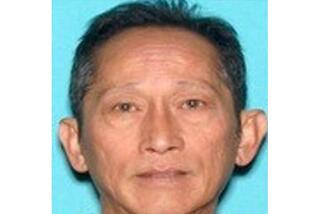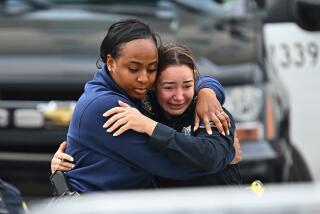Lam Defense Loses Bid to Delay Start of Retrial
- Share via
A judge on Monday rejected a defense attorney’s request for more time to prepare his case and ordered a Wednesday start to the second trial of Minh Van Lam on charges of murdering Cal State Fullerton Prof. Edward Lee Cooperman.
Orange County Superior Judge Richard J. Beacom, who two weeks ago chastised Lam’s lawyer, Alan May, saying he had turned the first trial into “a circus,” told May and prosecutor James Enright to be ready to start picking a jury Wednesday.
Sees No Disadvantage
May complained outside court that he, Enright and the presiding judge of the court, Everett W. Dickey, had agreed last week to start the new trial April 10. But he said he did not think Beacom’s order to go to trial sooner would hurt either the defense or the prosecution.
Lam, 21, a former student of Cooperman, will stand trial on second-degree murder charges resulting from the Oct. 13 fatal shooting in the physics professor’s office. Cooperman was internationally known for his scientific and humanitarian aid to Vietnam’s Communist regime.
Lam’s first trial ended with a hung jury last month. Because all 12 jurors voted against convicting Lam of first-degree murder, that charge was dropped. But the jurors were unable to agree whether the Vietnamese student was guilty of second-degree murder or lesser charges, so he will face those allegations again.
Dickey on Monday reassigned the case to Beacom, who presided at the first trial, and rejected May’s request that a partial transcript of Lam’s first trial be sent to the state Judicial Council and the State Bar to determine if May was guilty of unethical conduct.
May’s request last week came after Beacom accused May of turning the proceedings into “a circus” and “bombarding the jurors with such a confusing array of evidence” that they were unable to reach a verdict.
Beacom said May hinted that Cooperman’s own activities led to his death, accused the professor of being a thief, implied he was a homosexual and claimed he illegally sold sensitive material to Vietnam. But the judge said May “didn’t prove any of it.”
Although May said that because of Beacom’s remarks he would seek a different judge for the second trial, he said Monday he had decided not to do so.
“I don’t think it’ll get me anywhere,” the lawyer said. “Even though I don’t agree with him (Beacom) and I think he has shown some prejudice toward me, I don’t think I could prove it would affect the trial.”
May said he considered Beacom a “fair and judicious person” and any prejudice that Beacom might have against May would not “interfere with the conduct of this trial.”
After the first trial, jurors reported that they were deadlocked 7 to 5 in favor of a second-degree murder conviction, 11 to 1 against a voluntary manslaughter verdict and 9 to 3 for involuntary manslaughter.
May said that although he had wanted to delay the start of the second trial, he felt Beacom’s order to start proceedings Wednesday was “as rough on the prosecution as it is on me” and would not help either side.
No Motive Given
Enright, the chief homicide prosecutor in the Orange County district attorney’s office, is replacing Mel Jensen, the deputy district attorney who prosecuted the first trial. Enright was unavailable for comment Monday.
The prosecution was hampered in seeking a first-degree murder conviction by its inability to ascribe a motive for the shooting to Lam. Although it is not necessary to prove a motive to win a first-degree murder conviction, juries are allowed to consider a lack of motive as favorable to the defense.
Cooperman’s wife and friends contend that he was assassinated because of his efforts to aid Vietnam. But prosecutors said they had no evidence to support that theory.
Lam said in statements to the police that he accidentally shot Cooperman while the two were “horsing around” with the gun in the professor’s office in the university’s Science Building.
More to Read
Sign up for Essential California
The most important California stories and recommendations in your inbox every morning.
You may occasionally receive promotional content from the Los Angeles Times.













